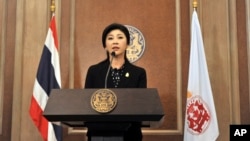Thailand's embattled prime minister has proposed the creation of a national reform council in an attempt to resolve the country's ongoing political crisis.
Prime Minister Yingluck Shinawatra has already dismissed parliament and called for early elections, but this has failed to satisfy opposition demands she resign.
Yingluck on Wednesday said the proposed reform council would work alongside the new government, which is to be elected February 2.
She also said, however, that the body would not be part of the government, and that its members would be chosen by an independent commission.
Its tasks would include studying constitutional amendments, changes to the economy, ways to address corruption, and electoral reform.
There has been no response from protest leader Suthep Thaugsuban, who has said there should be reforms before the election is held.
Suthep has vowed to disrupt the vote. Anti-government protesters have tried to block sites where candidates are trying to register.
The ex-deputy prime minister has led weeks of protests, many of which have occupied government buildings in the capital.
Protests in Bangkok
Protesters say the prime minister's removal is necessary to purge the country of corruption and money politics. They view Yingluck as a puppet of her brother, former prime minister Thaksin Shinawatra.
Thaksin, a billionaire businessman, was ousted in a 2006 military coup. He is living in self-imposed exile overseas after being convicted of corruption.
Yingluck and her brother have the support of Thailand's rural poor, largely because of Thaksin's policies to bring virtually free health care, cheap loans and other benefits to the long-neglected countryside. However, they are strongly disliked by the urban middle class and more educated elite.
The main opposition Democrat Party said Saturday it will boycott the vote, which Prime Minister Yingluck Shinawatra's ruling party would likely win.
Prime Minister Yingluck Shinawatra has already dismissed parliament and called for early elections, but this has failed to satisfy opposition demands she resign.
Yingluck on Wednesday said the proposed reform council would work alongside the new government, which is to be elected February 2.
She also said, however, that the body would not be part of the government, and that its members would be chosen by an independent commission.
Its tasks would include studying constitutional amendments, changes to the economy, ways to address corruption, and electoral reform.
There has been no response from protest leader Suthep Thaugsuban, who has said there should be reforms before the election is held.
Suthep has vowed to disrupt the vote. Anti-government protesters have tried to block sites where candidates are trying to register.
The ex-deputy prime minister has led weeks of protests, many of which have occupied government buildings in the capital.
Protests in Bangkok
Protesters say the prime minister's removal is necessary to purge the country of corruption and money politics. They view Yingluck as a puppet of her brother, former prime minister Thaksin Shinawatra.
Thaksin, a billionaire businessman, was ousted in a 2006 military coup. He is living in self-imposed exile overseas after being convicted of corruption.
Yingluck and her brother have the support of Thailand's rural poor, largely because of Thaksin's policies to bring virtually free health care, cheap loans and other benefits to the long-neglected countryside. However, they are strongly disliked by the urban middle class and more educated elite.
The main opposition Democrat Party said Saturday it will boycott the vote, which Prime Minister Yingluck Shinawatra's ruling party would likely win.






